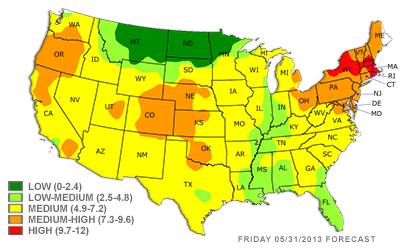
Respiratory Conditions - Allergic / Non-Allergic
Items of interest for adults/children with upper (eye/ear/nasal/sinus) and lower (laryngeal/lung) airway symptoms.
You can subscribe to get the latest news on Respiratory Conditions delivered to your inbox: Subscribe
- Details
- Published on Wednesday, 21 August 2013 13:25
Recreational and even elite athletes can be affected by exercise induced airway reactivity (EIA) which can present as cough, shortness of breath or exercise limitation. Whether working out for aerobic fitness or training for competitive athletics, EIA symptoms can be subtle or dramatic and may be more than just "getting into shape".
For those who wish not to be sidelined by EIA, an exercise related action plan developed in partnership with an allergy/asthma specialist can get an athlete back in the game. See how an exercise action plan can be developed in the video below.
- Details
- Published on Wednesday, 25 September 2013 13:22
 Dr. Steinberg can be seen discussing asthma and allergic conditions on the Massachusetts Medical Society's Physician's Focus program (HCAM-TV).
Dr. Steinberg can be seen discussing asthma and allergic conditions on the Massachusetts Medical Society's Physician's Focus program (HCAM-TV).
----
Asthma affects an estimated 24 million people in the US, and its incidence is especially high in New England. A study by the Asthma Regional Council of New England has found that the New England states have some of the highest asthma rates in the country. Asthma affects nearly 1 in 10 residents in the six state region.
In Massachusetts, 10 percent of children have the condition. Asthma incidence is also growing among adults. From 2000 through 2007, the number of adults with asthma jumped 16 percent, according to the Massachusetts Department of Public Health.
Dr. Steinberg, a specialist in asthma and allergic conditions and Past President of the Massachusetts Allergy & Asthma Society, explained the basics of this allergic condition, how it is diagnosed, and how it is treated in this edition of the Massachusetts Medical Society's - "Physician Focus" program with host Bruce Karlin, MD.
- Details
- Published on Wednesday, 25 September 2013 13:27
Children, not their parents, should do most of the talking about their asthma symptoms when seeing an allergist, according to a new study.
Researchers looked at 80 children with asthma and their parents. Although parents can provide useful information, it's important for allergists to ask both parents and children about symptoms, activity limitations and use of medications to better understand and treat the child's asthma, the researchers found.
The importance of listening to children with asthma is highlighted by the fact that they report having a better quality of life in terms of activity limitations than their parents believe, according to the study, which was published in the July 2013 issue of the journal Annals of Allergy, Asthma & Immunology.
"Parents can often think symptoms are better or worse than what the child is really experiencing, especially if they are not with their children all day," Burks said in a news release from the American College of Allergy, Asthma & Immunology.
The asthma experts list five topics that children with asthma and their parents should discuss with their allergist:
- Details
- Published on Thursday, 29 August 2013 14:21
Millions of children with asthma, food allergies and other allergic conditions attend school each year. Asthma is the most common cause of school absenteeism. Parents, students and school officials can help kids stay in school by getting their action plans in order.
Read about the importance of having an allergy/asthma action plan and 10 steps to prepare for a safe school year for children and others with allergies and asthma.
- Details
- Published on Wednesday, 16 October 2013 13:54
The Centers for Disease Control and Prevention puts the annual cost of asthma in the United States at more than $56 billion, including millions of potentially avoidable hospital visits and more than 3,300 deaths, many involving patients who skimped on medicines or did without.
“The thing is that asthma is so fixable,” said Dr. Elaine Davenport, who works in Oakland’s Breathmobile, a mobile asthma clinic whose patients often cannot afford high prescription costs. “All people need is medicine and education.
- Details
- Published on Monday, 22 July 2013 14:52
This week's extreme heat and air quality have presented challenges for many respiratory patients. Time for patients with respiratory conditions to upgrade their action plans.
Those in need of a long term allergy/asthma action plan can start this process by checking out www.massallergy.net.
- Details
- Published on Wednesday, 25 September 2013 13:29
Students and teachers spend a significant percentage of their time in enclosed environments at school. This link gives parents, students and school officials some issues to consider when assessing the impact of the school environment on the health of its occupants. Read More
- Details
- Published on Wednesday, 25 September 2013 13:32
Whether you're moving across town or across the country, you need to factor in allergies.
- Details
- Published on Friday, 31 May 2013 14:24
Allergy/asthma patients in eastern Massachusetts continue to experience challenging allergic/respiratory conditions this week with >90 degree temperatures and some of the highest pollen counts in the country. Peak tree pollens + rising grass pollens + > 90 degree temperatures means its time for our allergy/asthma patients to activate their upgraded seasonal allergy action plans.
Those in need of a long term allergy/asthma action plan or for management of other allergic conditions can start this process by checking out www.massallergy.net.

- Details
- Published on Sunday, 15 September 2013 15:51
Take a look at this video from WebMD on how to use a nebulizer - watch video.
